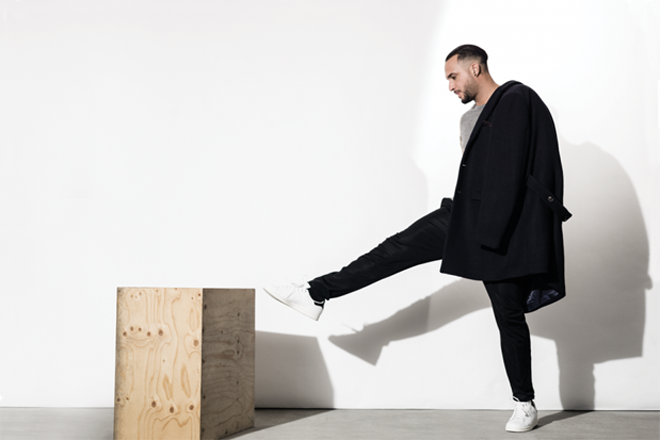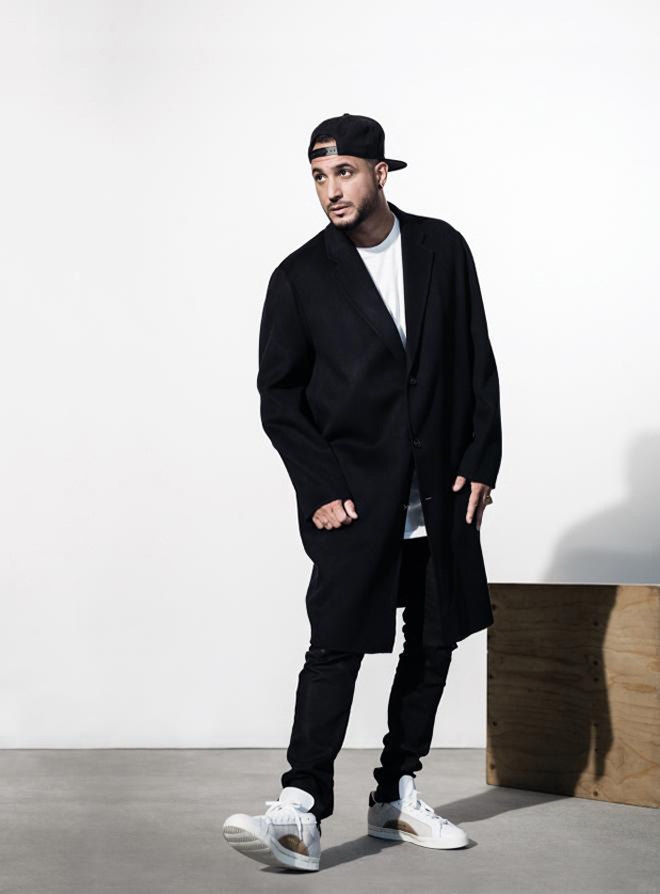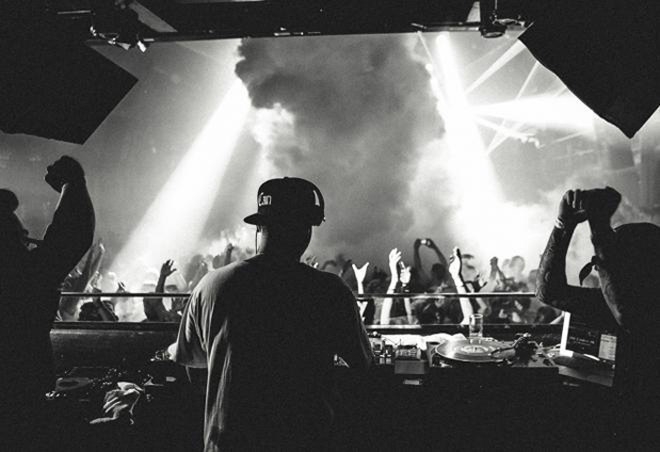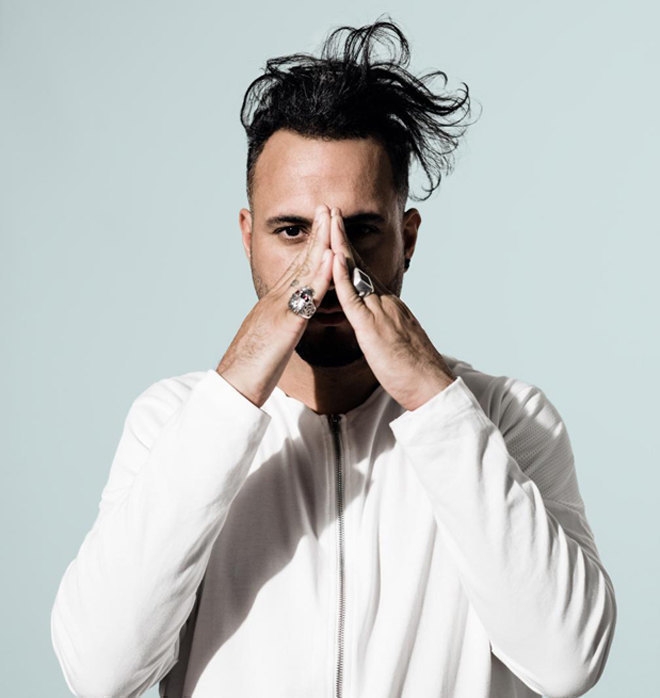Cover Feature: Loco Dice
Loco Dice is back: and not just on Ibiza

WORDS: JOE ROBERTS | PHOTOGRAPHY: ROBERT WUNSCH | STYLING: CHANTAL DRYWA | GROOMING: SASKIA KRAUSE
It’s a balmy Wednesday evening in Ibiza town and the intimate dinner we’re expecting with Loco Dice has taken a strange turn. Following instructions to come to the first floor terrace of Cipriani, an open-air restaurant overlooking the millionaires’ yachts in Ibiza harbour, when we arrive at 9pm there are already about 50 people in attendance. Waiters in bow ties circulate with trays of Bellinis and canapés, but Loco Dice is nowhere to be seen.
Instead, familiar DJ faces, including Richie Hawtin, Carl Cox, Chris Liebing, Jonny White, Hector, tINI, Dan Ghenacia and Dyed Soundorom, mingle with a stylish international coterie. There’s tanned flesh everywhere, barely an exposed forearm without a sleeve of tattoos, one even sporting fresh, plastic-wrapped ink. In the distance the Old Town is illuminated so brightly it resembles a metropolitan skyline, accentuating the cosmopolitan mood. Suddenly, a two-minute warning goes out. He’s on his way. As the man of the hour appears on the far side of the restaurant, the words to ‘Happy Birthday’ start in unison. Tonight, we discover, we’re taking part in Loco Dice’s 41st birthday celebrations.
Almost a decade has passed since Mixmag last documented a night out with Dice, an extended London session that finished sometime in the hazy hours of Monday evening. Back then the hip hop-turned-house DJ was surfing the peak wave of minimal, turning Circoloco at DC10 into the institution it is today. At the same time he was forging a personal reputation for marathon party endurance, both on and off the decks. Dice left Circoloco in 2006, the minimal scene imploding a couple of years after. But the Düsseldorf-based DJ and producer – who wears his Tunisian roots on his sleeve, enshrined in a tattoo of the national flag – has seamlessly evolved into one of the world’s biggest DJs outright, as evidenced by those paying their respects tonight.
This season he’s been back on the island that helped break him, after a year away. Joining international club brand HYTE as one of the residents at their weekly Wednesday night party, it’s the perfect build-up to the release of ‘Underground Sound Suicide’, his second album. Packed with guests, from fellow HYTE resident Chris Liebing and ex-Rip Rig + Panic singer Neneh Cherry to Jay-Z producer Just Blaze and UK Grime MC Giggs, it arrives seven years after his status-cementing debut ‘7 Dunham Place’, giving numerologists something extra to get excited about.

Working the room like a pro, greeting each guest in turn, Dice’s six-foot-something basketballer’s frame is accentuated by an outfit that could be straight from the streets of 90s New York. Only his patterned trousers add a European touch to the oversized, baggy black tee, hi-top Jordan trainers and a backwards cap bearing the Murk logo. In the counterintuitive way that sometime happens with denizens of the night, he looks far younger than his years, something he puts down to his North African heritage.
When we finally sit down at around 1am by the pool of the plush Gran Hotel, following a five-course meal and a surprise, sparkler-covered birthday cake, an offhand remark about his cap reminds us how long he’s been hustling.
“Oscar [Gaetan] is my old-time friend, bro,” he says of the Murk veteran, his vernacular peppered with Americanisms picked up from a lifetime listening to hip hop. He may have been less visible, but Dice was already on his way up before minimal, playing New York’s Centro-Fly party after his debut single, 2002’s ‘Phat Dope Shit’. Here he met promoter Rob Fernandez (who sadly died this year), and hung out with the likes of Danny Tenaglia and George Morel. “I know most of these cats from when I wasn’t even a big DJ,” he says.
Talking about his early days “playing dirty Sneak records, Armand Van Helden-style,” as he slouches back on an outdoor sofa with a mojito, this schooling in straight-up groove carried him beyond the crash of minimal. “My bio used to say ‘123bpm chunky terrace music’,” he says, making it clear he was distancing from the term even at the time. Anyway, ‘minimal’ originally meant to him the reduced sound palette of records like Plastikman’s ‘Disconnect’, a discombobulated K-hole of a track which he’d drop to send DC10 wild, rather than the plinky-plonky, codified ‘minimal house’ sound it became.
When we speak to Hawtin in the restaurant, he sums up Dice’s sound. It’s “that hip hop style and attitude, playing house records, dropping a crazy techno record or a vocal thing looping over the top. He’s always been very open-minded and diverse.” These qualities made him the ideal partner for the duo’s 2012 CNTRL tour, an attempt to educate America in electronic music beyond EDM.
Loco Dice on the DC10 years: “I was exhausted. I was doing all kinds of crazy stuff”
Tweet this quote
Not that Dice sees himself as poster-boy for the ‘underground’ any more. When we come to the suggestive title of his album, he’s vociferous in his dismissal of the word and its over-use. “We never reached the status of Afrojack or all these guys, but we still rock 20,000 people,” he says. Some people might still want him to be the guy who wrote the Minus anthem ‘Seeing Through Shadows’, but what’s defined Dice is a willingness to experiment: “If I decide tomorrow to do something with Bunny Wailer, it doesn’t mean I’m going to put dreads on and be a Rastafarian.” Snoop Lion would have done well to take note.
His last Ibiza run was in 2013, when his Used + Abused daytime party at Ushuaïa featured the likes of Timo Maas, the German DJ who hooked him up with longstanding co-producer and writing partner Martin Buttrich. “He ruined my T-shirt last week with Jägermeister, just to let you know how deep we are. Motherfucker!” laughs Dice when we ask if he and Maas are still tight.
With giant billboards lining the drive from the airport into Ibiza town declaring that Dice is back, was there a reason he stepped away?
“I was exhausted,” he says candidly, describing the toll taken by his non-stop schedule. Talking euphemistically about living “very intensely” during his Circoloco years, a time when he shared a villa over the summer with Antonio from the party, these days Dice goes to the gym every day. “I was doing all kinds of crazy stuff,” he says with a flash of his irrepressible smile, pointing out that he hasn’t completely given up afterparties: the previous weekend in Cannes spent hanging out with Visionquest, Tale of Us and Mind Against. It’s just that he’s begun to appreciate life beyond excess.
Last summer, as well finishing the album in his Düsseldorf studio, he refocused his energies on his label, Desolat, and friends outside of clubs: “People who know me as Dice,” he says of his original nick-name, before he earned the prefix ‘Loco’, meaning ‘mad’. “Dice the dancer, Dice the sprayer, Dice the homie on the street trying to survive not being German.” With many of these old neighbourhood friends unimpressed by techno, they’re his secret grounding – alongside his family, who he mentions but won’t reveal anything about. “That’s my life when I’m away from all this.”

He’s still tight with the DJs he knows from his hip hop days, too: Tapesh, Kurd Maverick, even Chuckie, “a ‘commercial’ DJ” he says, bristling at another label people are quick to ascribe but whose meaning has become blurred. Loyalty and respect are at the heart of what Dice does. He’s open to creative ideas from anybody in his team, from bookers to PAs, and has allies in the most unlikely of places.
“Our friendship seems awkward coming from such different backgrounds, but we have more in common that you think,” says Miss Kittin, who came to Dice’s studio in Düsseldorf to record vocals for ‘Burn Ca$h Ash’. An album cut that harks back to the glory days of electro house, its lyrics encapsulate the ennui and inflated egos of DJ life that Dice says he’s circumnavigated. “It’s rare enough in our business,” she says of their longstanding connection, which started in the early years of Dice’s residency at DC10, where they played back-to-back and he’d rinse her track ‘The Beach’. “Of course, we also have different approaches to our careers, but we both know where we come from.”
Dice starts off diplomatically when we ask about the 2010/2011 revolution in Tunisia, the country he used to spend every summer holiday with his family. But after explaining that his opinions are diluted by only hearing news second- or third-hand, he switches to full flow, leaning forward to tell us he’s flying there to play the next day – despite having been given warnings not to because of terrorism. “How much more can we show that we’re cool people?” he asks, frustrated, explaining that the country needs European help. “We started the revolution, and the revolution is still alive. I feel for the young brothers and sisters in my country. They only want good education and a good life, and they’re fighting for it.”
Dice understands, because Tunisia’s struggle encapsulates his own. Before getting a German passport his teenage prospects seemed bleak. Growing up in a rough area of Düsseldorf called Flingern, it was inevitable to him that his life would go down a well-worn path. His first cigarette, his first joint, his first fight. Kids like him were destined to be criminals and thugs. Prison beckoned. Alienated from his surroundings, he found identification in the faraway struggles depicted by NWA, Ice-T, Ice Cube and Public Enemy. A plan began to form. Rooting through other people’s rubbish to find old turntables to fix, music would be his way out.
“We never reached the status of Afrojack, but we still rock 20,000 people”
Tweet this quote
“I hated it and loved it at the same time,” says Dice of his old neighbourhood, which he nods to on album track ‘Back in Flingern’. Like him, though, it’s experienced a massive turnaround. In 2006 he and Buttrich moved to Brooklyn, New York, swapping one graffiti-covered area for another, to record Dice’s debut album. While there, his partner in booking agency Artist Alife set up their offices just a block from where Dice grew up. “It’s the coolest spot now,” he laughs at this unexpected aspect of gentrification.
This early period formed the unique visual way that Dice produces music. “We were making a movie in our head,” is how he describes soaking up hip hop’s vivid tales; “we escaped into a dream world which kept us alive somehow.” He still has a grand internal cinematic vision, knowing when to drop a bassline in the studio because of what’s happening to a character in his head. It’s something he’s coaxing out further for ‘Underground Sound Suicide’, each release having its own video. The first, for ‘Get Comfy’, draws inspiration from Blade, The Prodigy’s ‘Firestarter’ and Dice’s love of kung-fu flicks.

His recent return to his roots reignited his first musical love, a sound he’s never stopped listening to. He’s animated while telling us stories of almost having Busta Rhymes on the album, his excitement at seeing the platinum discs hanging in Just Blaze’s house and how, despite not knowing much about grime, he got on with Giggs because “Hip hop guys know each other. It clicked between us right away.”
After growing up in what he calls its golden age, which he says died along with Tupac and Biggie, he’s totally enthused again. “Meek Mill and Drake are dissing each other to death. The entertainment that was in hip hop is completely back, but without killing each other.” Just Blaze, or A$AP Rocky and Skrillex, show how hip hop is fusing with electronic music. This he credits to Timbaland, who paved the way by using that acid house staple, the 303, in Aliyah’s ‘Try Again’. Everything he holds dear is beginning to converge.
It’s 7am and light is flooding through the roof of Amnesia’s terrace. Dice is rolling deep, the DJ booth packed with friends and crew. Next to him a girl dressed in a green shroud holds up a teddy bear. Amnesia’s dancers have retired for the night, so the room’s central podium is flooded with fans. For just under four hours Dice has been holding court, flawlessly mixing high-energy house accentuated by double- and triple-kick rolls. There’s been a burst of 808 electro, even an excursion into hardcore break-beat, but now he starts twisting minds with whirling noises panning around the room. Out front a banner unfurls, reading ‘We Love Loco Dice’. 8am approaches and another cake appears. In the front row stands a bearded, shamanic-looking man, intense eyes fixed on the DJ.

By mid-morning we’re at an afterparty, of course. In the front room of a giant villa all the girls look like models, French windows opening out to a patio and a pool beyond. Benny Rodrigues is playing 90s-flavoured house while dancers begin disappearing to the toilets in discreet pairs. It’s outside we discover Dice, though, sitting among friends at a long table; nearby, a chef is preparing food at an al fresco kitchen. We’ve barely been here an hour when he gets up to leave.
In the past it was his mum, who had bailed him out of so many scrapes, who took the most convincing of his chosen profession. Is she proud of him? “She’s just happy that I’m healthy and I live from what I’m doing,” he replies, getting to the crux of Dice 2.0, the responsible raver intent on confounding expectations. “She looks in my eyes and sees the young boy she raised. That’s important to my mum, and that’s important to me. The moment I change, I know my mum would kick my ass!”


